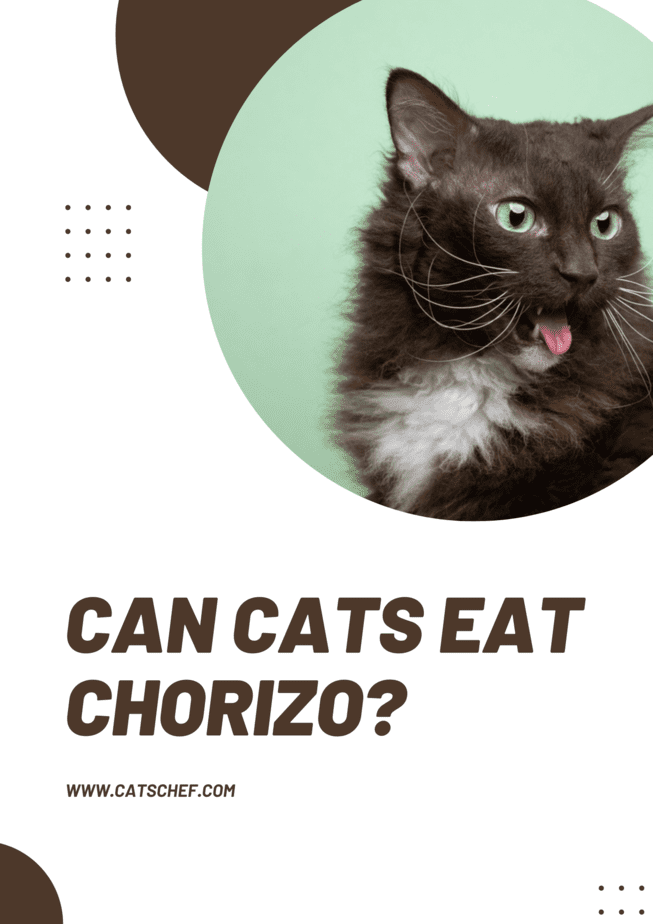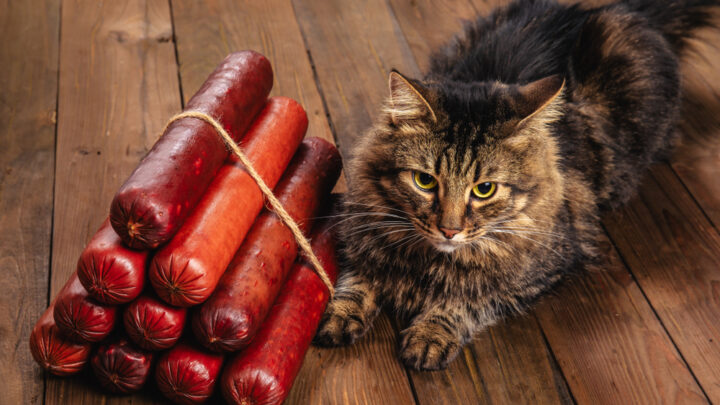There are certain foods that your cat is crazy about but they end up being quite harmful. Cured meat is one of those because of its ingredients. Can cats eat chorizo as it’s also a type of cured meat?
You’re probably thinking, Why should I leave my kitto feline out of my lunch plans? It is meat, after all, and cats are supposed to consume it, right?
Well, perhaps you aren’t aware of all the bad stuff this type of food contains. It’s not the safest and most healthy option for humans, let alone for our furry friends.
However, we tend to give in to the temptation of feeding our pets human foods. Sometimes, this can be a great way to add nutrients to their diet. Other times, not so much.
Human foods often pose a certain threat to cats’ health. It’s not something entirely uncalled-for, however.
We know that feeding our furballs anything other than cat food can come at a risk. Their digestive system is sometimes unable to break down the ingredients we have no problem devouring.
Can cats eat chorizo safely?
This shouldn’t even be a debate because there’s more harm than good when it comes to cured and processed meats like salami and ham. Although these meats contain protein, it isn’t enough to outweigh the negative effects.
You’d think that meat products like these are welcomed in the feline world. It’s a widely known fact that cats are obligate carnivores and rely on animal-based products.
There is a big BUT here. Highly processed meat usually loses its nutritional value by the time the product’s finished.
Small quantities aren’t likely to cause immediate harm to your furball. It’s not the end of the world if she grabbed a small, bite-sized piece that fell on the floor.
But it’s certainly not recommended to encourage her to eat it in large quantities as it can lead to an upset stomach. And this is just a mild reaction as opposed to others.
Therefore, if you want to keep your pet safe and healthy, you will avoid chorizo and other cured meats.
What is chorizo made of?
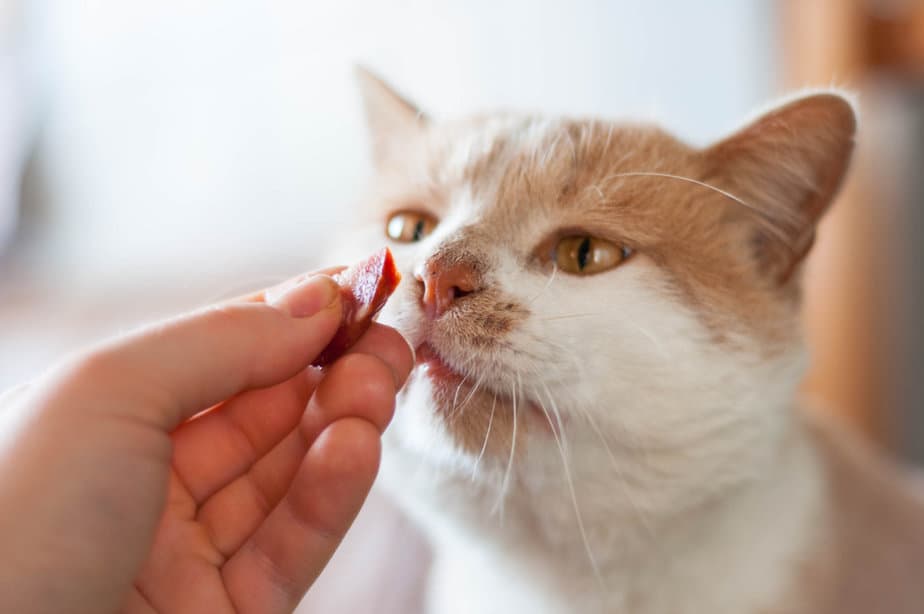
We’ve established that it’s a type of meat, but what kind? This part will likely appeal to your pet because it’s made up of ground pork.
However, there’s more to this sausage than what meets the eye. Unfortunately, meat isn’t the only thing incorporated into this food.
Chorizo has lots of additives and preservatives that help enhance the flavor and help to keep the product fresh on the shelves for as long as possible. It’s because of this that processed meat is so affordable and delicious.
Although a cat’s diet should mainly consist of meat, this type isn’t the best possible choice for them. The seasonings and various spices can be awfully detrimental to their health.
1. Pork as a protein source
Let’s dive into some of the pros and cons this meat carries. As cat owners, we want all the best for them.
Protein is an essential nutrient found in animal-based foods. It’s important for developing strong and healthy bones and for felines to develop fully.
It’s also an amazing energy source and an immune booster, fueling a cat’s body in every sense. Without it, your pet would quickly fall sick.
However, protein isn’t the only nutrient found in pork.
2. High-fat content
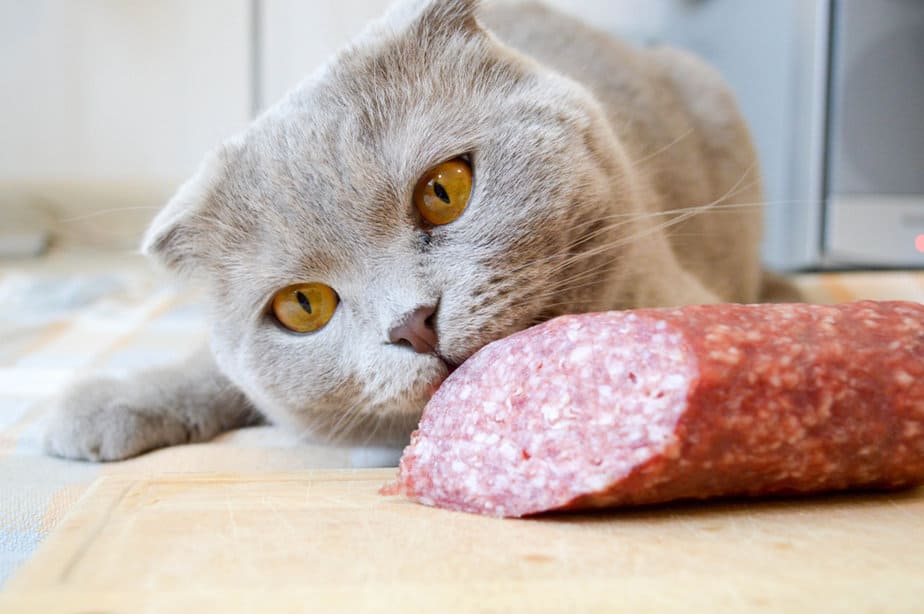
Unfortunately, chorizo is packed with salt and has higher amounts of fat than duck meat, for instance. Additionally, it’s considered a calorie-dense food, which is not fit for your cat’s diet.
Small portions of it on the odd occasion are fine but don’t overdo it. High-fat content food is detrimental to your pet’s health in the long run.
Pork meat, if consumed daily, can raise your pet’s blood cholesterol levels, which leads to a series of unfortunate outcomes. It includes an increased risk of heart disease and stroke. The fatty deposits could eventually block the arteries, preventing critical blood flow.
Not to mention the obesity that comes with feeding your cat high-fat foods like these. Excess weight will put additional stress on her joints and be the cause of inflammation.
3. Carbs and calories
Next to fat, carbs and calories are also abundant in this chopped and ground pork product.
Carbohydrates are an unnecessary nutrient for felines and don’t hold any value to them. They’re unable to digest carbs properly, which results in a build-up of carbs in their digestive system. All of this, sooner or later, accumulates into fat that adds to your cat’s weight gain.
One of the major problems related to obese cats is the development of diabetes. As if all of these health hazards weren’t enough to deter you from feeding your cat chorizo and salami, there’s also a risk of pancreatitis.
It’s not easy to discover it as the symptoms are usually non-specific, such as lethargy, vomiting, and diarrhea. AND these three illnesses (obesity, diabetes, and pancreatitis) often go hand in hand.
4. Salt and preservatives
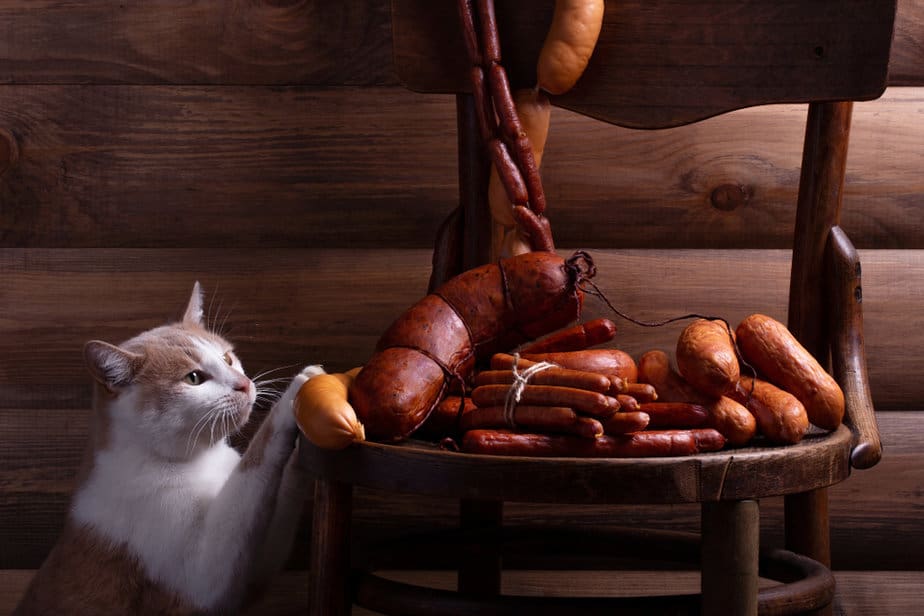
This is arguably the most troublesome part of processed meats. Although these additions add significant flavor, these same ingredients are quite detrimental to your feline’s health.
Sodium is an essential mineral in the body, but in excessive amounts, it becomes poisonous to felines. Therefore, this cured sausage poses the risk of your pet being subject to salt toxicity.
Although unlikely if she has small quantities every now and then, sodium can accumulate over time in her digestive system and become a disaster. The most common signs of salt poisoning are diarrhea, abdominal pain, vomiting, as well as excessive urination and dehydration.
As for preservatives, they’re not as poisonous, but can be hazardous as well. Although they may be used to preserve the food and stop it from going bad, they don’t prevent it from being bad for cats.
These various additives will have a negative impact on your furry friend’s well-being over time. They don’t hold any nutritional value to her and they’re way off from being a natural part of a cat’s diet.
Some additives and sweeteners are even poisonous to pets, such as xylitol. Thankfully, this chemical compound isn’t found in chorizo, but keep an eye out for any human treats, such as gummy bears.
5. What about spices and seasonings?
Apart from pork fat and high salt content, deli meat contains various spices and seasonings as well.
While these are mainly used to enhance the flavor of the products such as chorizo, prosciutto, and others, they can have less desirable effects on our felines.
Cats aren’t drawn to human spices and condiments; in fact, they’re often deterred by them. Such is the case with black pepper that can be found in these pork sausages.
Now, we know that spices differ from one type of chorizo to another. Unfortunately, they all contain ingredients that are harmful to our fluffy pets.
The difference between Spanish chorizo and Mexican chorizo
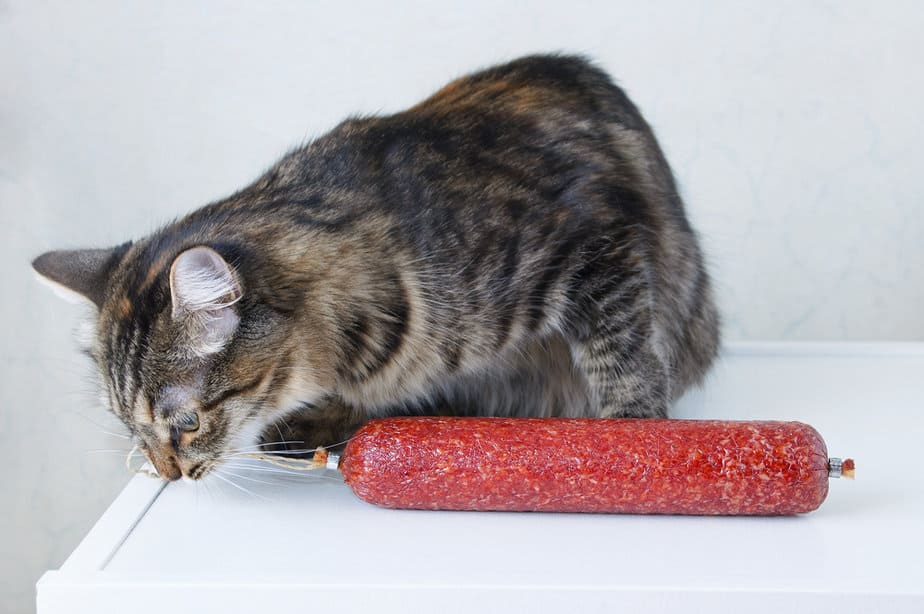
Spanish chorizo is uncooked sausage made from chopped-up pork, while Mexican chorizo mostly consists of ground pork.
But the main difference is in the ways these two sausages are produced. For instance, Spanish meat is cured with large amounts of salt and can be eaten uncooked. On the contrary, Mexican ham isn’t cured, but rather fresh, so it needs to be cooked.
Can cats eat chorizo if it’s cooked?
Now, we know felines shouldn’t eat raw meat as it can carry certain diseases such as salmonella. Does that mean cats eat cooked chorizo then?
Well, it’s definitely a better idea than feeding your pet raw chorizo, but you should ask yourself whether she really needs this in her diet.
Moreover, the spices used in these sausages are bound to make your cat ill to a degree. For instance, Spanish chorizo uses paprika to add a sweet and spicy flavor.
We may like this, but our cats certainly won’t. It causes an upset stomach with abdominal pain. If your feline’s had some spiced chorizo, you’ll likely see her nose running and eyes getting puffy and watery.
Mexican chorizo uses red pepper instead of paprika, which is somewhat safer for cats. However, both of these contain poisonous garlic powder.
Garlic – along with the other members of the Allium family like onions, chives, and leeks, for instance – is highly toxic to felines. It destroys feline’s red blood cells, resulting in various types of anemia.
In severe cases, the effect of alliums can be deadly. Therefore, we recommend you skip feeding these spicy pork sausages to your furry friend.
Can cats eat chorizo in the end?
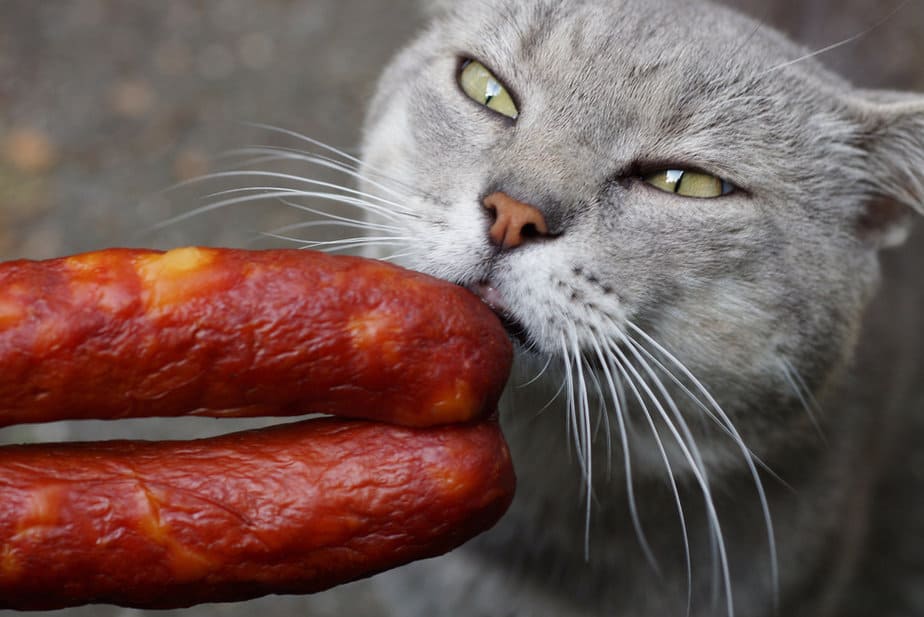
If you’re still somehow wondering whether cats can eat chorizo, the answer is pretty clear: No, cats can’t and shouldn’t eat chorizo.
It’s unlikely your pet will suffer deadly consequences if she steals a nibble, but why risk her health? There are many disadvantages to this food as opposed to the good sides (protein).
The high-fat content is a disaster waiting to happen. Over time, your pet could develop health issues such as obesity, pancreatitis, as well as diabetes.
Next to these dangers, we have the risk of salt poisoning, as well as toxicity caused by garlic, other spices, as well as preservatives and additives. Not to mention that raw meat, such as Spanish chorizo, poses the danger of bacteria and diseases.
Rather leave the chorizo and other sausages to you and your human loved ones, and treat your furbaby to cat-friendly treats.
